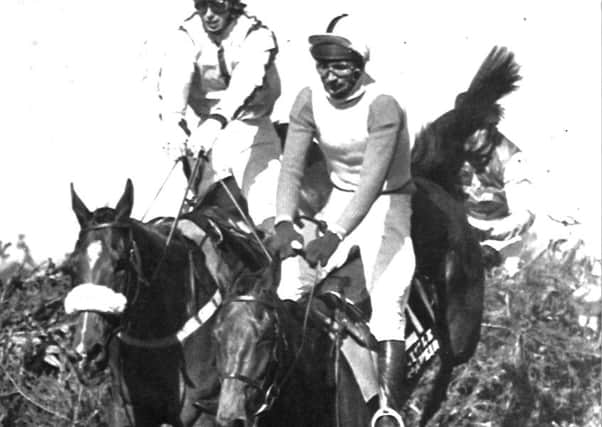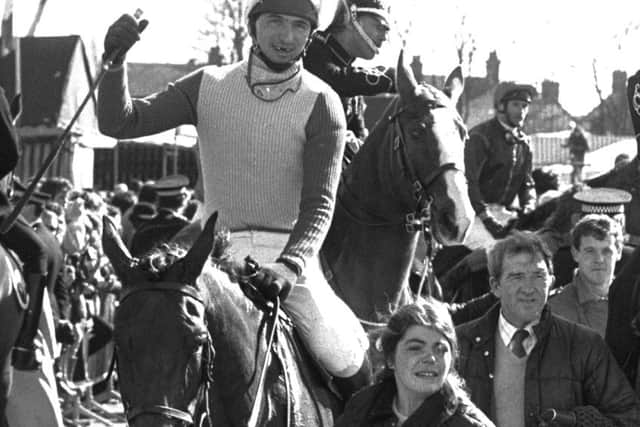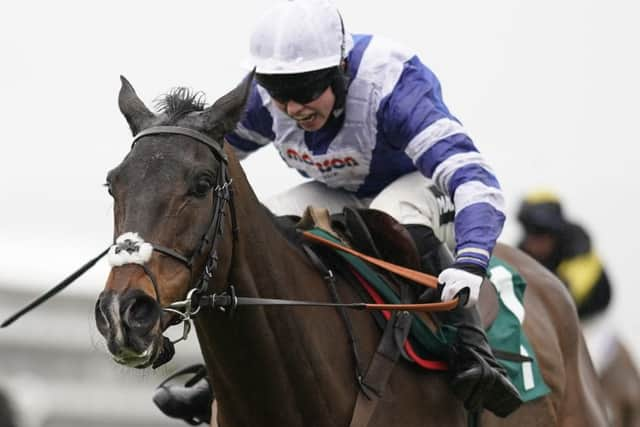Sporting bygones: Jimmy Frost survived heat of Aintree battle to savour Grand National glory


But he is now becoming accustomed to being introduced as Bryony’s father, further recognition of the growing impact being made by his daughter who has become one of the new faces of jump racing after a childhood riding ponies on Dartmoor.
The younger Frost’s profile is such that her brilliant winning ride on Frodon last month – she became the second female jockey to win a Grade One race at the Cheltenham Festival after Katie Walsh – made front and back page headlines.
Advertisement
Hide AdAdvertisement
Hide AdHowever, while a broken collarbone means the talkative and effervescent 24-year-old will miss this Saturday’s Randox Health Grand National where she was hoping to improve on last year’s fifth aboard Milansbar, racing’s new heroine will be on Merseyside to celebrate the 30th anniversary of her father’s finest hour.


Father and daughter are now a familiar sight on the country’s racetracks as they walk the course, leaving nothing to chance, while the younger Frost’s relationship and rapport with her horses has also seen her become integral to champion trainer-elect Paul Nicholls.
This experience stems, in part, from Frost senior’s horsemanship – and example – when his first ride in the National was a winning one aboard Little Polveir for the redoubtable trainer Toby Balding, who had described his rider as a “good jockey, long legs and no brain”.
Just getting a ride in the race, at the relatively advanced age of 30 was an achievement. “People were always asking me what I did for a living. ‘I ride horses’, I’d say’,” wrote the jockey in his autobiography Touched By Frost.
Advertisement
Hide AdAdvertisement
Hide Ad“What sort of horses?” they would ask. “National Hunt horses,” I’d reply. “Oh really – you’re a jump jockey then. Have you ever ridden in the Grand National? they’d ask.


“Every time I would have to say no and they would be thinking, ‘he’s no good then’. So you can imagine my delight that at last I could say I’d ridden in the race, even if it meant we only got as far as the first fence.”
Ninth to West Tip in 1986, Little Polveir – named after a salmon pool on the River Dee – failed to complete the gruelling course in the next two renewals and was thought to be past his best when he was bought by Ted Harvey and switched from the stables of John Edwards to the yard of the formidable Balding.
The latter always joked that his biggest contribution to this particular success was doing “nothing wrong” in the six weeks that he had the horse before the biggest race of all.
Advertisement
Hide AdAdvertisement
Hide AdFrost had studied the form and watched the replays of the 1988 race when Little Polveir was travelling like the winner before parting company with jockey Tom Morgan. He felt moved, on the eve of the race, to tell his wife Nikki: “I’ve got a feeling we can get in the first three.”
Surprised by the crescendo of cheers from the grandstands during the preliminaries, Frost – who had memorised the colours of his 39 rivals – quickly had to resort to plan B when he found himself following 300-1 outsider Hettinger, one of the most dubious jumpers in the line-up.
However he tucked in behind 1986 winner West Tip, again ridden by the mercurial Richard Dunwoody, and both safely negotiated Becher’s Brook before the most famous fence in racing claimed several casualties in a hideous pile-up that saw Balding’s Brown Trix and Seeandem fatally injured.
With a circuit to go Little Polveir was in the lead – a light weight of 10st 3lb helped – as heavy ground made the daunting fences even more intimidating.
Advertisement
Hide AdAdvertisement
Hide Ad“From that point we were on our own. Little Pol had taken it up and I wasn’t doing anything,” wrote Frost, now a respected trainer in his native Devon, in his evocative memoir wthathich also helps to explain his daughter’s bubbly and engaging character.
“We hit the open ditch. ‘S***’, I thought, but he was so clever he bounced over and got away with it. That was our only near-disaster. I had tried to get him to stand off, but he needed a little short stride and got so close he actually put a front foot on the rail of the ditch. We soared over Becher’s second time with a clear lead and were waved wide. I just caught a glimpse of Brown Trix lying dead.”
As they cleared the Canal Turn Frost told his willing horse “Good boy, Pol. You’re doing well chap” while reminding himself of the basics that were serving him so well – “rhythm, concentrate, rhythm, keep him going”.
Turning for home Frost and Little Polveir were still in the lead as they narrowly missed a couple of over-zealous spectators who had strayed, idiotically, onto the racecourse. “They moved, thank goodness, because with hindsight if I had run into them they would probably have brought me down,” explained the relieved rider who drew strength from the fact that his children would be able to say that their father had once led the National.
Advertisement
Hide AdAdvertisement
Hide AdDown to the last and Little Polveir was joined by the Chris Grant-ridden Durham Edition, one of the most consistent Aintree performers, as Frost began to fear the worst.
“Horses were coming at me, but we weren’t really going. It felt like we were treading water and were probably going to drown,” he reflected. “He was feeling heavy and was slowing down. ‘We’re going to get caught, Pol, come on’, I said.
“It was a feeling of desperation as I tried to regenerate some energy into his tired muscles. He wasn’t happy when I gave him a couple of slaps with the whip, so I used my hands and heels and the energy button came on.”
Frost and Little Polveir’s cause was helped when they were joined by the riderless Smart Tar. Frost, too scared to look round to see the pursuers, added: “I just kept riding for all I was worth, and he just kept going too.”
Advertisement
Hide AdAdvertisement
Hide AdA wise move on his part. The quality of the pursuers was testament to Little Polveir’s bravery – the aforementioned West Tip ran on gamely to finish second with former Gold Cup winner The Thinker third as the admirably consistent Durham Edition faded to fifth.
The fallout from the race following the latest equine fatalities saw a motion tabled in the House of Commons calling for the race to be banned.
It led to the notorious brook on the landing side of Becher’s being filled in and the slope on the landing side being levelled off. Further modification were then made after the 2012 race, and while the National is now a fairer test it is still a thrilling spectacle – the race that every jockey wants to win.
Just ask Jimmy Frost – or his proud daughter Bryony who, despite her injury misfortune, has her sights already set on next year’s race and the chance to become the first female jockey to win the Grand National.
National is race for hunting folk - Toby Balding
Advertisement
Hide AdAdvertisement
Hide AdTOBY Balding provided a fascinating insight into what it takes to win the Grand National after watching Little Polveir prevail in 1989 under Jimmy Frost.
“Jimmy is as good a horseman as you’ll see on the circuit, and they looked after each other out there,” he reflected. “I’ve always maintained the National is a race for hunting folk, and Jimmy is a long-legged lad who gives a horse a chance.”
This was a day to remember for Balding whose Champion Hurdle heroes Morley Street and Beech Road also prevailed on the Aintree undercard.
Born in the United States, he had previously trained Highland Wedding to win the 1969 Grand National. He excelled with National Hunt horses – he also won a Gold Cup with Cool Ground in 1992 – while his brother Ian was responsible for Flat luminaries such as Mill Reef.
Advertisement
Hide AdAdvertisement
Hide AdBalding, who died in 2014, was a huge supporter of his nephew Andrew, now a leading Flat trainer, and his niece Clare, a prominent sports presenter.
He was also just as proud of the young riders that he nurtured at his legendary Hampshire stables from the aforementioned Frost and Richard Guest, who now trains at Wetherby, to Adrian Maguire and, more recently, Sir AP McCoy.